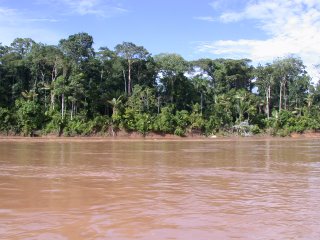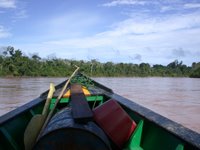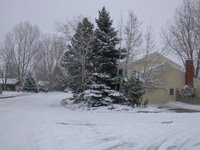More tidbits from last summer's travel journal...The Manu river is a tributary of the Amazon, emerging from the Peruvian Andes in southeastern Peru, and passing through a well-protected national park. It took us two days in a 4wd bus crossing the Andes, then another two days travelling by river to reach the park.

This is the Amazon basin. A carpet of green 60 feet high tumbles over the edge of a creamy, coffee-colored, ribbon of water that snakes its way from the towering wall of the Andes to the Atlantic Ocean. This is the world’s original interstate highway system, with off-ramps leading deeper into the heart of this creature. Howler monkeys cry out in a distant but steady pulsating drone – day and night, they sound off to the beating heart of the forest.
It’s morning. Our dugout slices easily through the muddy ripples and wavelets as we travel upstream along the Manu River. The air hangs heavy as wet wool, but for now, it’s clear. Sunshine so intense, it’s as though the sky is a giant magnifying glass. The gentle rocking of the boat and steady hum of the motor lull the mind into a dreamy state. This is a world unlike any I have known - a world left out of time. It’s the kind of place that writers love - inspiring stories such as ‘Congo,’ ‘Lost World,’ and ‘Jurassic Park.’ We spy a capybara family trotting along the muddy shore - the mama is the size of an Australian Shepard. This is the world’s largest rodent. Their rotund, furry bodies are slick with mud. The babies look like little piglets.
Somewhere in the forest are people. Living the same way they have for a millennia. Rarely seen. Always watching. I imagine them moving noiselessly through the forest with spears and bows – larger versions than the ones sold back at the tourist lodge. They wear colorfully beaded necklaces and anklets, and have intricate tattoos that tell the story of their tribe. How strange we must look to them, with our pale white skin – at least the parts of it that we’re willing to expose to the insects and the sun. And out feet – so tender we encase them in rubber. We make raucous noises as we stomp along the trails, trying to avoid the mud and the army ants. Our synthetic smells and harsh language frighten away any of the animals we hope to see.

To think that humanity likely emerged from forests such as this on another continent! Yet, here we are, as helpless as newborn babes, startled at every sound in the underbrush, coating ourselves with clothing and chemicals. We have fancy cameras on hand, wanting to capture the experience of jungle life, as long as we can remain within the safety of the bubble of our modern life.
We arrive at Cocha Salvador: one of the many ox-bow lakes dotting the landscape. Where the Manu was churning and bubbling and full of energy, the lake is a piece of dark glass. We board a floating platform, reminiscent of the ferry you board at Disneyland when crossing to Huckleberry island. Our guide paddles us slowly across the lake.
A yellow-headed vulture alights on the branch of a nearby tree. A pair of them. No. More. Five we count now. They peer at us through alien eyes, through the blue tattoos that mark their alien faces. A gurgling screech and a flutter of wings breaks the silence a bit further along the shore. A pair of ‘
hoatzin’ perches on a fallen tree, creaking at each other. A prehistoric looking bird – looks like it flew right out of ‘Jurassic Park’ - about the size of a chicken, with big eyes, a scrawny neck, and a yellow and purple Mohawk.
Moments later, out of the silence comes a guttural, yet high-pitched combination of a yip and a buzz – almost mechanical whirring. A ripple of water near the shore, and a sleek black head emerges from the dark lake. Splashing and more yipping from the underbrush. Then out on a log branching across the surface of the water emerges a slim dark body with four long legs about the size of a dog, and a long slim tail – this is the baby. Mama otters average about four feet long, and Papa can be up to six feet. There is an entire family here, fishing in the shade of the brush.
I still have the feeling I’m at Disneyland, crossing to Huckleberry Island. I remember my first trip to Huckleberry Island – I was 5 years old. I thought it such a wild and unforgiving place. Thrilling and frightening at the same time. Somewhere in the caves on the island I lost my parents. That’s the first time I ever felt all alone in the world – so far from anything I knew. Thirty years later, I find myself truly alone – 100 miles from the nearest road, in a wild and unforgiving place. Wholly dependant on my guide. Thrilling and frightening. And tranquil. It’s so silent, but for the buzz of the forest and the oar dipping into the surface of the lake. I decide that this the place I want to come back to again and again in my mind, when my own world gets to be too much to handle. I want to remember that this place is here – that this is my life too.




